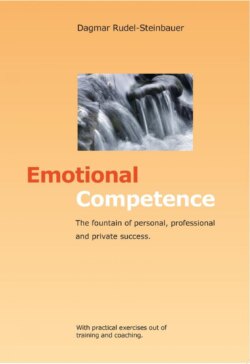Читать книгу Emotional Competence - Dagmar Rudel-Steinbauer - Страница 3
На сайте Литреса книга снята с продажи.
2 Thoughts that led me to write this Book
Оглавление“What is the use to reach the moon if we cannot overcome the chasm that separates us from ourselves? This is the most important expedition and without it, all others are useless.”
Antoine de Saint-Exupéry, French writer and pilot (1900–1944)
A strong trend for new key qualifications (such as the capability for teamwork, cooperation and motivation) has been noticeable in the last few years, which are associated with social or emotional competence.
According to many studies and reports, it is increasingly important to bring a certain portion of these qualities such as emotional competence into our professional as well as private lives.
The psychotherapists say that people are threatened with self-alienation through their lack of self-perception and the overload of external stimuli; and so our innermost, emotions and needs will be neglected.
Futurologists are predicting that values such as empathy and emotions will be in great demand.
Psychologists know that the key to all social competence is in the presence of emotional competence.
At the same time, the educational ideals of our western culture stress the importance of intelligence, logic and rational thinking. Grades, Pisa tests, exams and minimum duration of studies are the focus of the educational discussions.
Where are, in fact, the sensitization and encouragement of emotional competence in our culture, which should be supported in all areas? It has little room in our school system, as well as serious support for emotional competence in areas of adult education - mostly in professional life -, which is of very little value at this time. It is present only in a few curriculum or master courses just as it is not present in leadership training programs.
A further consideration, which led me to this subject and motivated me to write this book, was my many years in adult education, human resources development, consultation and coaching.
I realized - repeatedly - that the participants had the right tools for good communication or recognized the solutions to their conflicts. However, they lacked deeper competences such as the needed amount of empathy or sensitivity to solve the misunderstanding or conflicts in the team, to see the other person´s point of view or at least to try to understand him or her.
Social education has also strongly influenced and inspired me. The subject of how to strengthen our sensibility towards others has often been brought up in seminars that I have held as a trainer. Yet, it is my observation that especially the area of social education needs an awareness of one´s own feelings and emotions. For the percentage of burn-outs in these jobs are growing (but not only here) as the people involved are so devoted that they often forget to look after themselves. The awareness of one´s own psychological well-being is often forgotten.
Likewise, I had the impression that conflicts took place because of the lack of ability for maintaining social interaction, as well as not knowing one´s breaking point and the inability to regulate and motivate oneself.
These four areas are what emotional competence is all about:
To have vigilance for myself and my emotions
To have vigilance towards others
To have vigilance for relationships and common interaction
Ability to regulate one´s own emotions and motivation to act accordingly
The ability to recognize emotions and to deal with them accordingly is not to be underestimated. In this way, emotional competence plays a very important role, if not the most important role – as expressed by Saint Exupéry in the introduction.
There are many very good books about emotional competence. But I found that they lacked ideas how to increase one´s own emotional competence. In this book, I also want to give guidelines and suggestions that can support the promotion of emotional competences. I developed these guidelines from my personal experiences in coaching, training and adult education courses. Clearly, they can only be suggestions. How intensively you will follow them is your own decision. Furthermore, the application is dependent on your own experience and what focus you want to place on developing your own fountain of success.
I would be happy to hear from you if you have questions, suggestions or thoughts which you want to share with me:
E-mail address: info@training-steinbauer.at
